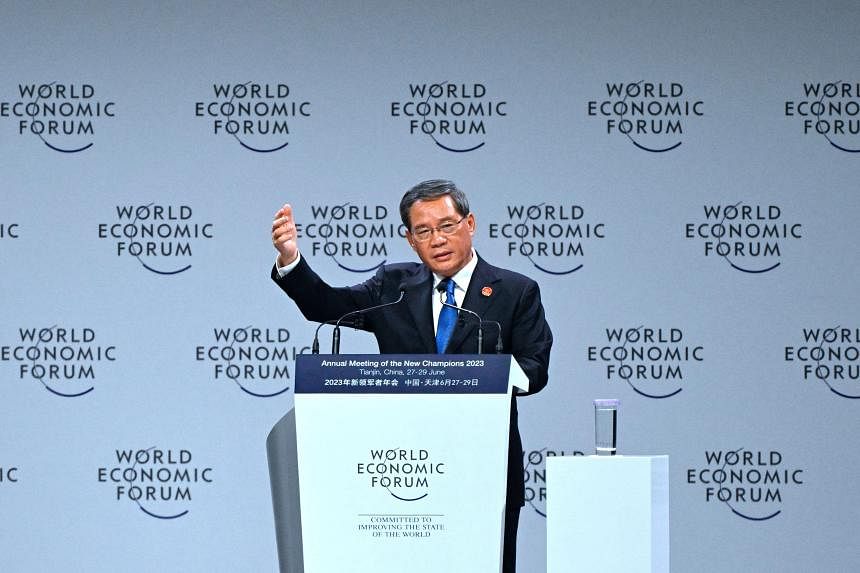TIANJIN – Chinese Premier Li Qiang warned world leaders against politicising economic issues, calling the notion of de-risking a “false proposition” that could bring about a host of problems.
Countries should, instead, work together to maintain a stable global supply chain while managing competition that will inevitably arise in an open trading system, he said at the start of a World Economic Forum (WEF) annual meeting in the north-eastern coastal city of Tianjin on Tuesday.
Mr Li’s remarks follow similar urgings made last week in Germany and France on his first overseas visit since becoming premier in March, amid growing momentum in Europe to reduce its dependency on China.
“Some people are hyping up the so-called reduction of dependence and de-risking. I think, to a certain extent, these two words to reduce dependence and risk are a false proposition,” he told his audience, who had gathered from around the world for the WEF Annual Meeting of the New Champions.
“Economic globalisation has already created a community. The economies of all countries are intertwined and interdependent.”
Beijing has sought to counter the narrative of a de-risking strategy that is hardening in Europe and now adopted by the United States.
The European Commission last week released a proposal toughening regulations over the export and transfer of critical technology and investments, stepping up a strategy that was first outlined by its president Ursula von der Leyen in March.
In his recent visit to China, US Secretary of State Antony Blinken also said he communicated to his Chinese counterparts that the US was not out to “decouple but de-risk and diversify”, in the name of protecting its national interests.
But his claim has been met with scepticism, with Chinese officials dismissing it as rhetoric serving the same intent.
Premier Li urged business leaders in Germany last week not to let their government dictate the rules of de-risking.
On Tuesday, he repeated the call, saying that if there was a risk in a certain industrial chain, “it’s not up to governments or any one organisation to decide”.
Businesses are the most sensitive to risks and “also have the most say”.
“Enterprises should make the appropriate judgment and choice. And our governments and their related organisations should not overstep their authority. And they should not politicise, ideologise or generalise de-risking. This will cause many problems,” said Mr Li.
More than 1,500 political and business leaders, academics and innovators from 90 countries are gathered in Tianjin for the three-day “Summer Davos” of networking and discussions on innovation and technology, especially in the green and health sectors.
The event was last held in the port city of Dalian in 2019 before the Covid-19 pandemic paused it.
The meeting also serves as a platform for Mr Li to court foreign investment as China’s economic recovery loses steam.
Economists expect Beijing to roll out a stronger stimulus to shore up the economy after both industrial output and retail sales missed forecasts in May. Youth unemployment also hit a record high of 20.8 per cent and global demand stayed weak.
But Mr Li projected optimism on Tuesday, saying growth in the second quarter of 2023 will trump the first quarter’s 4.5 per cent.
Promising “more pragmatic and effective measures” to spur domestic demand and open up to foreign investors, China is on track to hit its growth target of around 5 per cent for the full year, he said.


